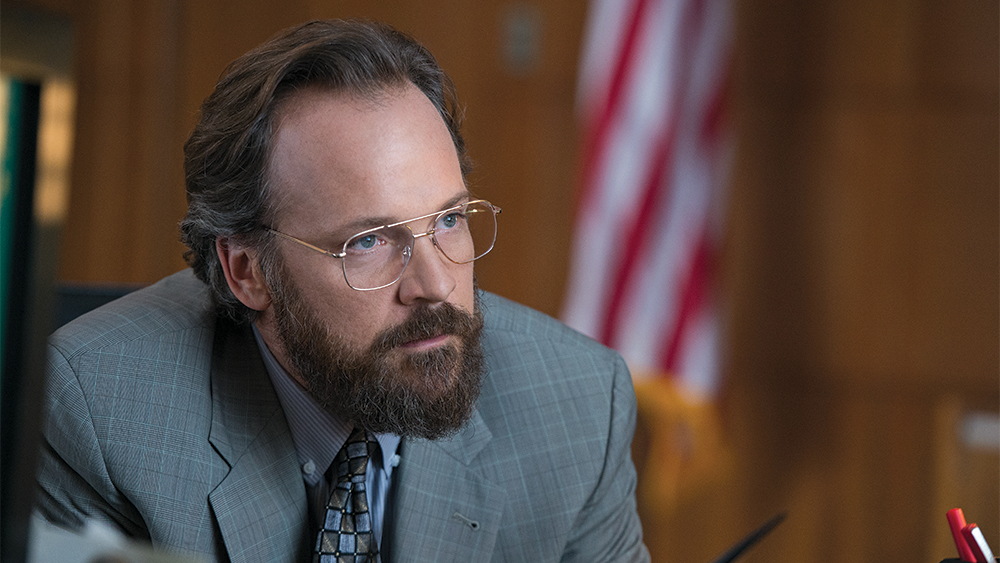‘The Looming Tower’ Leads Trend of Emmy Contenders Adapted From History
By Rob Owen
LOS ANGELES (Variety.com) – Whether it’s the suggestion of vulgarities a real person used decades ago or family worries about how their dead loved ones are depicted in a more contemporary series, adapting history can be a minefield for limited series and TV movie writers and producers.
“Genius: Picasso” executive producer Ken Biller acknowledges every script from the most
recent season of the National Geographic anthology drama was vetted by a lawyer. This necessary precaution was taken after Olivia de Havilland sued FX Networks over how she was portrayed in last year’s “Feud: Bette and Joan.”
“In light of the ‘Feud’ lawsuit, I think the studios have gotten a little more careful about depicting historical figures, and as in the case of ‘Feud,’ there are a few people in our story who are still alive,” he says, noting “Genius,” like “Feud,” is produced by Fox 21.
Dan Futterman, executive producer of Hulu’s road-to-9/11 drama “The Looming Tower,” says Legendary Entertainment hired outside counsel to read through footnoted versions of scripts.
“They’d come back with questions, sometimes looking for more source material and sometimes asking for changes,” he says. The concerns were mainly around dialogue. “Would this person have known this at that time?”
But it’s not just legal risk that can make it difficult to adapt history, it’s also the scrutiny from real-life participants.
For HBO’s “Paterno,” which relies on some scenes of the famed Penn State football coach Joe (played by Al Pacino) with his family, director Barry Levinson says the effort was to make a human drama, not a documentary.
“I’m sure somebody will argue over this moment or that moment or whatever,” he says. “I look at it as, is this a humanistic look into the time and incidents that took place?”
Levinson adds that the film pieced together what Paterno family members said in interviews and then came up with dramatic scenes.
“The sensibility is what we tried to get at,” he says. “It’s not like we invented one son who was going to be adversarial. You’re trying to stay around the information that’s provided.”
For the Paramount Network’s “Waco” limited series about the 1993 government siege of David Koresh’s compound in Texas, writer-producer brothers Drew and John Erick Dowdle admit it was necessary to condense the number of characters to make the story work on TV.
| “” scripts were vetted with lawyers. |
“We kept saying, ‘let’s only change something if it makes the truth more true,’” John Erick Dowdle says. “Instead of three people doing a thing, let’s make it one person to help the audience remember who was who. In early drafts we had a million characters. We said, ‘let’s boil it down’ and we merged a couple of people together. A big part of where’s that line [between fact and fiction] for us is if something is Googleable. We wanted to be fact-check-proof.”
Mikko Alanne, who adapted National Geographic’s “The Long Road Home,” from Martha Raddatz’s book of the same name about heroism on the front lines during the Iraq War in 2004, is more comfortable with the process than many, having focused on adaptations for the bulk of his career. But he notes that relying on real-life events in a story can set up the expectation for the audience that everything you’re showing them is true.
“My philosophy has always been influenced by what [filmmaker] Costa Gavras once said, which was, things don’t necessarily have to be literally true, but must be thematically and ethically true and that is the philosophy I strive towards,” he says.
Biller points to the difference between historical drama and historical fiction when considering how much to stick with facts versus taking dramatic license.
“In our case, because we’re dealing with Nat Geo and trying to do historical drama and not historical fiction, we took a journalistic standard, which is so say, there are a lot of conflicting accounts of Picasso. … We need more than one source to say something is what really happened,” Biller says. “So much of the National Geographic brand is about authenticity. Then you ask, ‘Where does that leave you as the dramatist?’ because our job is to entertain. But it’s not a documentary and it’s not an art history lesson. ‘Genius: Einstein’ wasn’t a science lesson. So how do we make it dramatic?”
Additionally, Biller points out that Picasso, as a man, was “full of contradictions.” The key was to balance how he “could be incredibly generous and famously cruel and selfish” in order to show all sides and be unbiased but well-rounded.
In addition to the story, adapting history often poses challenges at various levels of production.
For USA’s “Unsolved: The Murders of Tupac and the Notorious B.I.G.,” the biggest hurdle was an inability to get the rights to the hit music of the very stars the show chronicles.
“‘We kept Saying, ‘let’s only change something if it makes it more true.”
John Erick Dowdle
“I knew that going in,” says Kyle Long, creator of the series. “I wrote this on spec and with the music it wasn’t a financial thing, it’s just that the estates are notoriously protective, which I get.”
For “,” the production replicated Qatar City, including 113 buildings, in just 67 days at Fort Hood, Texas.
And then there’s also the question of timing on projects adapted from history: How soon is too soon?
“I wouldn’t want to tell a true story that happened yesterday,” says Long. “We really benefited from a wealth of information being out there.”
And while Futterman says he felt he had enough information to make “Looming Tower,” which is based on a book by Lawrence Wright, he acknowledges an overriding concern for the victims and their families.
“The thing we felt like was most driving it is an awareness on all of our parts that there are people who are directly affected by that day, by 9/11, who lost family members, who lost friends, who have been asking for answers repeatedly over the years and who haven’t gotten them,” Futterman says.
“They’ve been ignored or gotten the same unsatisfactory answers, or they’ve been told the information has been classified. Some of the wounds may be fresh or new in that they’re caused by this repeated denial of answers. So we might as well ask it again and very loudly and in Technicolor and then see what happens.”


